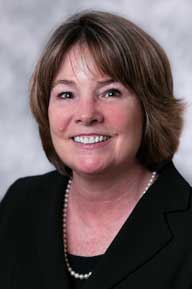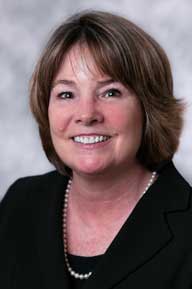 KINGSTON, R.I. – Aug. 26, 2013 – Math and science teachers are desperately needed in schools today to prepare the country’s youth for a labor market dominated by fast-growing jobs in technology and science.
KINGSTON, R.I. – Aug. 26, 2013 – Math and science teachers are desperately needed in schools today to prepare the country’s youth for a labor market dominated by fast-growing jobs in technology and science.
Thanks to the National Science Foundation, the University of Rhode Island is doing its part to inspire students and professionals to teach in the fields of science, technology, engineering and mathematics, or STEM.
URI has received a $1.2 million grant from NSF’s Robert Noyce Teacher Scholarship Program. This is the first time a university or college in Rhode Island has been awarded a Noyce grant.
The grant, announced Aug. 18, was awarded to the School of Education in the College of Human Science and Services (HSS), as well as to the College of Arts and Sciences.
“This is a great opportunity for URI to recruit and support students with strong science and math backgrounds into teacher education,” said Anne Seitsinger, of North Kingstown, interim associate dean of HSS and a professor in the School of Education. “The grant is a great accomplishment and shows how committed URI is to STEM education.”
Over the next five years, the Noyce grant will help recruit undergraduate STEM majors and STEM professionals who might not have considered a career teaching in kindergarten through grade 12. Specifically, scholarship money will support 20 undergraduate STEM majors at URI and five STEM professionals, such as chemists or engineers, who want to obtain their master’s degrees in education.
 These scholarship recipients will eventually teach elementary, middle and high school students in high-need school districts in Rhode Island and other communities in the country. The districts in the state will be Central Falls, Newport, Pawtucket, Providence and Woonsocket.
These scholarship recipients will eventually teach elementary, middle and high school students in high-need school districts in Rhode Island and other communities in the country. The districts in the state will be Central Falls, Newport, Pawtucket, Providence and Woonsocket.
During their first three years of teaching, these new Noyce scholars/teachers will receive regular mentoring and professional support from URI professors in the School of Education.
“This ongoing support from URI professors is crucial to the success of keeping beginning teachers in high-need areas,” said Seitsinger. “It’s important they have experienced mentors and professors to support them as they become highly effective teachers.”
Also, 50 freshmen and sophomores will receive paid summer internships – at Save the Bay, the Providence Boys & Girls Club, the Audubon Society of Rhode Island, among others – in STEM education areas. The internships will provide critical opportunities for URI’s STEM majors to participate in teaching experiences.
Rhode Island’s Congressional delegation and Governor Lincoln D. Chafee praised the award as a way to boost the presence of math and science teachers in the schools and help prepare the state’s young people for a global economy.
“On behalf of the State of Rhode Island, congratulations to the University of Rhode Island on being the first college and university in the state to receive a National Science Foundation’s Robert Noyce Scholarship grant,” said Governor Chafee. “I am pleased that a number of the highly trained scholarship recipients will be staying in Rhode Island and helping to give our students the knowledge they need to have successful math and science careers.”
“I am pleased URI is receiving this award and proud to have included this funding in the 2013 Appropriations bill,” said U.S. Senator Jack Reed, a member of the Appropriations Subcommittee on Commerce, Justice, Science, and Related Agencies (CJS), who recently helped pass a Senate CJS Appropriations bill that includes $7.4 billion for the National Science Foundation, an increase of $186 million over fiscal year 2013 that is projected to provide 510 more competitive grants nationwide in fiscal year 2014.
“Providing Rhode Island kids with a top-notch education in math and science starts with recruiting and training great teachers,” said U.S. Senator Sheldon Whitehouse. “I congratulate URI’s School of Education for receiving this award, which will help the school continue to prepare a new generation of math and science educators who can train future generations in these important fields.”
“We need to set our young people on a path to prosperity as early as possible, and that work happens in the classroom,” said U.S. Representative James R. Langevin. “By strengthening STEM education, we can get students excited about science and math-related fields, placing them on a path to professional opportunities in high-growth industries. This grant makes an investment in education, but also in our economy, as we give Rhode Islanders the tools they need to be successful.”
“I am delighted that the University of Rhode Island will receive this critical funding through the National Science Foundation to support teaching, scholarship, and research in the STEM curriculum and ensuring that young people develop the skills they need to compete in a global economy,” said U.S. Representative David N. Cicilline. “I look forward to working hard to bring home additional federal resources that will provide continued benefits for Rhode Islanders.”
The grant was awarded to Seitsinger and her team of David Byrd, director of the School of Education; John Boulmetis, professor of education; Christine Dolan, education specialist; Jay Fogleman, associate professor of education; Cornelis de Groot, associate professor of education; Jessica Libertini, assistant professor of mathematics; Joan Peckham, professor of computer science; and Kathleen Peno, associate professor of education.
“I am delighted that our faculty was awarded such a prestigious grant that addresses the need for excellent high school and middle school educators in science, technology, engineering and math, as well as collaborative education research opportunities with URI faculty,” said Lori E. Ciccomascolo, dean of HSS.
The Noyce scholarship is named for Robert Noyce, co-founder of Intel Corp and the scientist awarded the 1961 patent for the integrated semiconductor. The scholarship was funded through the NSF Authorization Act of 2002 in response to a critical need for teachers in science and math.
“Given the growing need to engage young students in learning about math and science, this grant represents a critical, timely, and much needed investment in quality education and is a tribute to the hard work of so many URI faculty committed to advancing opportunities for our students, teacher preparation and quality, and the STEM disciplines,” said Donald H. DeHayes, provost and vice president for academic affairs at URI. “Congratulations, and great work.”
According to the U.S. Bureau of Labor Statistics, jobs in science, technology, engineering and math are expected to grow at a faster rate in the next decade than jobs in other fields. STEM workers also receive higher wages, earning 26 percent more than non-STEM workers, the labor bureau says. Also, there will be one million STEM-related job openings by 2018.
Students interested in applying for the Noyce scholarships can contact Seitsinger at anneseitsinger@uri.edu. Graduates of the Noyce program are required to complete two years of teaching in a high-needs school district for every year of scholarship support.
“We’re looking for motivated and dedicated students and individuals to teach the next generation,” says Seitsinger. “I have no doubt we’ll be able to find those students at URI.”
Pictured above:
Anne Seitsinger, interim associate dean of URI’s College of Human Science and Services and a professor in the School of Education. Seitsinger and her team of professors and instructors won a $1.2 million National Science Foundation grant to encourage students and professionals to teach science and math to elementary, middle and high school students in high-need districts.
Jennifer Slater, who obtained her undergraduate degree in psychology from URI in 2007 and her master’s degree in education with teacher certification from URI’s School of Education in 2011, is student teaching mathematics to a boy at Veterans Memorial Elementary School in Central Falls, R.I., in 2009.

